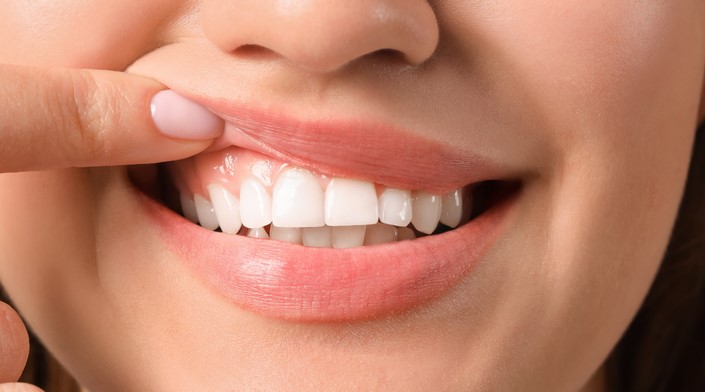
Introduction
Oral health plays a crucial role in our overall well-being, and gums are a fundamental part of it. Receding gums, medically known as gingival recession, is a condition where the gum tissue surrounding the teeth wears away or pulls back, exposing more of the tooth’s root. This not only compromises the aesthetics of your smile but can also lead to sensitivity, pain, and even tooth loss if left untreated. Understanding the causes of receding gums is essential in preventing and addressing this issue. In this article, we will delve into the factors contributing to receding gums and explore potential regrowth solutions.
Causes of Receding Gums
1. Poor Oral Hygiene: Inadequate oral hygiene practices, such as infrequent brushing and flossing, allow plaque and bacteria to accumulate along the gumline. Over time, this buildup can lead to gum inflammation (gingivitis) and, if not addressed, progress to gum disease (periodontitis), a major cause of receding gums.
2. Gum Disease: Periodontal diseases, characterized by bacterial infection of the gums and bone supporting the teeth, are a primary contributor to gum recession. These infections weaken the gum tissue, causing it to recede gradually.
3. Aggressive Brushing: Brushing your teeth with excessive force or using a toothbrush with hard bristles can erode the gum tissue and enamel at the gumline. This can lead to gum recession over time.
4. Genetics: Genetics also play a role in gum health. Some individuals may be predisposed to thinner or weaker gum tissue, making them more susceptible to receding gums.
5. Tobacco Use: Smoking or using tobacco products can reduce blood flow to the gums, preventing them from receiving adequate oxygen and nutrients. This weakens the gums and makes them more prone to recession.
6. Hormonal Changes: Hormonal fluctuations in women, such as during pregnancy, puberty, and menopause, can make gums more sensitive and susceptible to recession.
7. Grinding and Clenching: Habitual teeth grinding or clenching, known as bruxism, can exert excessive pressure on the teeth and gums, potentially causing them to recede.
8. Misaligned Teeth: Crooked or misaligned teeth can create uneven forces on the gums during chewing, leading to gum recession in specific areas.
How to Regrow Receding Gums
While gum tissue that has already receded may not fully regrow on its own, there are several steps you can take to halt further recession and promote healthier gum tissue:
1. Maintain Proper Oral Hygiene: Consistent and thorough oral hygiene practices are key to preventing further gum recession. Brush your teeth gently using a soft-bristle toothbrush and fluoride toothpaste at least twice a day. Floss daily to remove plaque and food particles from between teeth.
2. Use a Soft Toothbrush: Opt for a toothbrush with soft bristles to avoid damaging the gums while brushing. Consider using an electric toothbrush with a pressure sensor to ensure you’re not applying excessive force.
3. Address Gum Disease: If you suspect gum disease, seek professional dental care. Your dentist can perform a thorough cleaning and recommend treatment to manage the infection and prevent further gum recession.
4. Quit Tobacco Use: If you smoke or use tobacco products, quitting can improve blood flow to the gums, promoting their health and potentially slowing down the progression of gum recession.
5. Manage Teeth Grinding: If you grind or clench your teeth, especially at night, talk to your dentist. They can recommend a mouthguard to protect your teeth and gums from excessive pressure.
6. Correct Misaligned Teeth: If misaligned teeth are contributing to gum recession, orthodontic treatment (such as braces or aligners) can help realign teeth and distribute forces more evenly.
7. Gum Grafting: In cases of severe gum recession, your dentist might recommend a gum graft. During this procedure, healthy gum tissue is taken from one part of your mouth and grafted onto the areas with receding gums. This can help cover exposed tooth roots and promote new gum growth.
8. Natural Remedies: Some natural remedies, such as using aloe vera gel or oil pulling with coconut oil, have been suggested to promote gum health. While these remedies might offer mild benefits, they should not replace professional dental care.
Prevention Is Key
As the saying goes, prevention is better than cure. Taking proactive steps to maintain good oral hygiene and address potential risk factors can significantly reduce the chances of developing receding gums. Regular dental check-ups and cleanings are essential in identifying early signs of gum recession and addressing them promptly.
In conclusion, receding gums can pose a significant threat to both oral health and aesthetics. By understanding the causes behind this condition, we empower ourselves to take control of our oral health. While regrowing gum tissue may not be fully possible, implementing preventive measures and seeking professional dental care can go a long way in preserving the health of our gums and overall oral cavity. Remember, a healthy smile starts with healthy gums.